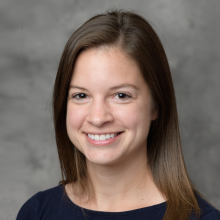April 2020 Spotlight on SRCD U.S. Federal Policy Fellow: Ellen Litkowski, Ph.D.
Ellen Litkowski, Ph.D., is a SRCD Federal Executive Branch Policy Fellow who is placed in the Office of Planning, Research and Evaluation (OPRE), Administration for Children and Families (ACF), U.S. Department of Health and Human Services (HHS)
“The intersection of research, policy, and practice.”
“Bridging the gap between research to policy.”
“Breaking down silos.”
“This work has implications for policy.”
As applied developmental scientists, these phrases become embedded within our vocabulary. But although I, too, used these words and phrases when thinking and talking about my research, I wanted and needed to know what interconnectedness between the academic and policy spheres really entailed – what policy implications and applications actually looked like. In the past eight months as a SRCD Federal Executive Branch Fellow, I have learned that this intersection is founded upon open and effective communication and collaboration between individuals who have varied expertise, diverse knowledge, different networks, and – at times – competing priorities. But there are no differences in how our work is driven by the ultimate goal of supporting children and families across the nation.
I am currently a first-year fellow serving in the Office of Planning, Research, and Evaluation (OPRE), which is situated within the Administration for Children and Families (ACF), within the U.S. Department of Health and Human Services (HHS). OPRE is uniquely positioned within ACF because it serves as the independent research and evaluation arm for ACF-sponsored programs. OPRE is comprised of four divisions, and I work within the Division of Child and Family Development (DCFD). Our work primarily focuses on three of the program offices – the Office of Child Care (OCC), the Office of Head Start (OHS), and the Children’s Bureau. Each of these offices serves unique populations using different funding mechanisms, but our work is highly collaborative and often informed by strategies and lessons learned in the projects across these offices.
Much of my daily work centers around my involvement in the grants and contracts that OPRE has awarded and manages. On the contract side, I arrived at OPRE just in time for the start of the federal fiscal year, and thus, the awarding of new contracts. October and November were filled with kick-off meetings among the contractors, program office representatives, and OPRE staff. Contracts at OPRE typically run on a 3- or 5-year life cycle, and so the kick-off meetings provide the opportunity to talk through the broad goals and timeline of the entire project, as well as to think deeply about who the key stakeholders in the work are, how and when to engage them along the way, and how individual components of the work inform each other. Seeing how each of our federal contracts incorporate continuous input from expert researchers, policymakers, and practitioners, this fellowship helped me understand ways to break down potential silos that exist between the academic and policy spheres.
It seemed as though as soon as we had awarded new contracts, we were already talking about what types of research we would be funding for the following fall! As OPRE works collaboratively with the program offices, our research projects are both informed by and responsive to our partners’ needs. As part of the Foundations for Evidence-Based Policymaking Act of 2018, program offices in the federal executive branch were tasked with creating learning agendas, which outline what their priorities are for the next five years. I had the opportunity to be a part of the learning agenda meetings for both the Office of Head Start and the Office of Child Care. Being privy to these conversations broadened both my understanding of how to conceptualize research questions with a wide scope and multifaceted components, as well as my knowledge of the national priorities related to early care and education. Following these discussions, I helped to draft several new solicitations, and so deepened my content knowledge about federal programs such as the Child Care and Development Fund (CCDF) program and key issues related to the reauthorization of the associated block grant. Moreover, I thought deeply about how we can leverage research to inform the implementation of these policies. Slowly but surely, through engaging in these conversations, working on existing projects, and developing new ones, I have begun to build my own bridge between research and policy.
I would be remiss if I did not mention the impact of the ongoing coronavirus pandemic on my fellowship experience. Our program partners are faced with incredibly time-sensitive decisions and demands and we at OPRE are trying to leverage our research expertise to provide assistance. We have taken this opportunity to think about ways we can utilize current contract mechanisms to better understand some of the issues brought to light by the pandemic, as well as develop potential resources to support families, providers, states, territories, and tribes. Seeing individuals across the offices embrace the call to action during this tumultuous time has solidified just how incredibly grateful I am to be working alongside people who have devoted their careers to supporting the lives of children and families. I am so thankful to all who have made this fellowship opportunity possible!
